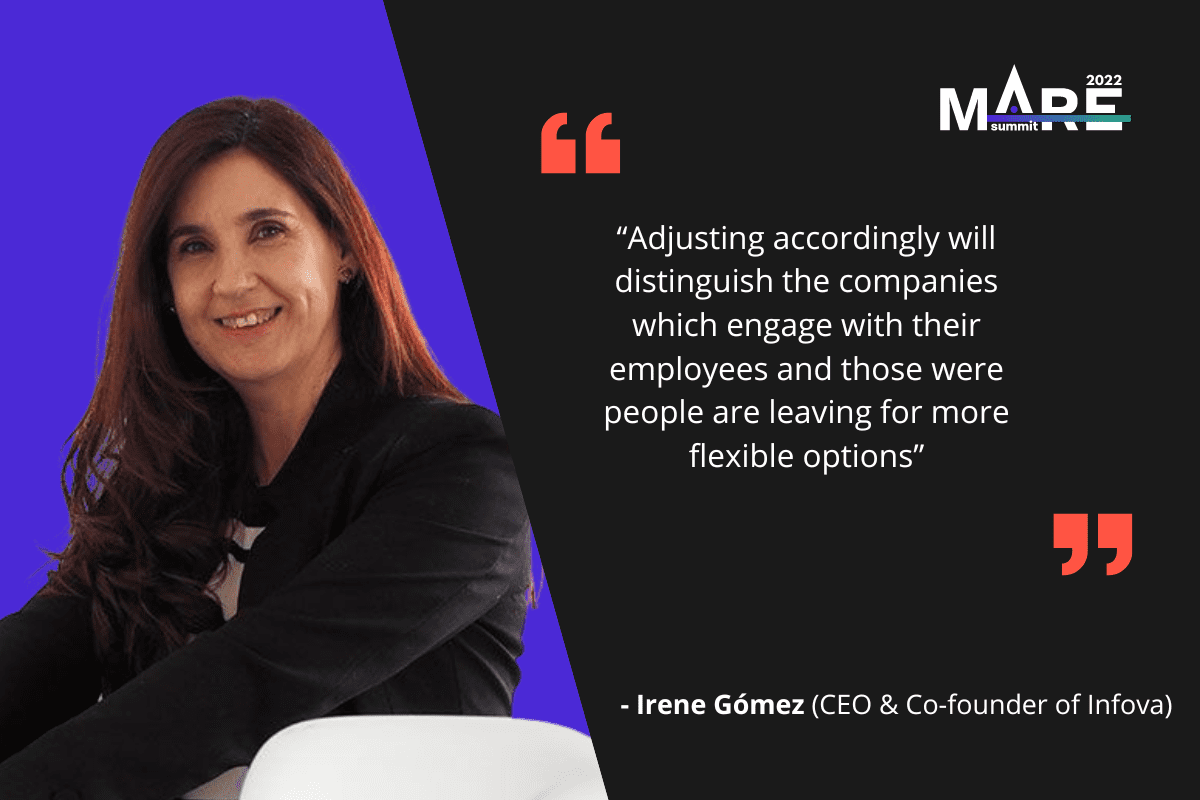Conference: Real Estate Repositioning
Description
The logistical challenges of COVID19 are well known to all Real Estate professionals, but we are yet to understand the profound motivational and team management challenges the pandemic and the return to normality will entail. Irene Gonzalez, CEO and co-founder of INFOVA gives us the keys on how to maintain motivation and manage a team in times of change.
Speaker
Irene Gómez :Founder and CEO of INFOVA
Conference Insights
Irene Gómez, co-founder and partner of Infova, a management film dedicated to Learning and Development, delved on the matter of hybrid team management and, more generally, about what makes some teams perform better than others.
Not only a matter of physical distance
Hybrid does not only refer to places or timetables: it refers to people who are geographically scattered across the globe, belonging to different cultures, generations. New generations are coming up fast, bringing with them new expectations about work. We must reimagine the way we see our teams. Managing people in this new world requires new tools, new skills, new tips. However, one must remember that there are no universal recipes.
The basic ingredient: trust
The secret to successful hybrid team leadership boils down to how well people can engage with each other and with the work they do. Engagement is built on a foundation of trust, which is defined as ‘choosing to make something important to you vulnerable to the actions of someone’ (Charles Feltman).
Vulnerability is crucial for building trust between people, particularly so between those who are geographically scattered across the globe, or belong to different cultures or generations. Among other things, lack of trust makes us avoid delegation, withhold information and feedback, and to not consider other people’s ideas in earnest.
Rethink what leadership means
Building trust requires thinking about leadership from a new perspective.
The traditional leadership narrative is self-centred (your vision, strategy, talents and charisma), but that is not what leadership consists of. Leadership is about empowering people as a result of one’s presence, about making this empowerment last even when one is not present.
How can one build trust? Primarily, by fostering authenticity. Authenticity is projected by being honest and committing to one’s words. Losing trust can almost always be traced back to a breakdown of one’s faith, his/her judgement and competence, or when other people think that one does not care about how they feel.
Tools for team building: emotional bank account and positive presumptions
According to Stephen Covey, relationships work as an ‘emotional bank account’. Every interaction between two people is said to have two accounts: one contains one’s own point of view and interpretation of the facts, whereas the other contains the narrative of the other person.
Under this view, a deposit would imply: showing genuine interest in, taking care of, counting on, giving positive feedback to the other person. Withdrawals would entail hiding information, showing controlling behaviour, not showing how much that person is appreciated.
When negotiating tension with one of the team members, one should check the ‘accounts’ balance’.
Another tool to deploy when team building is positive presumptions, which consist of choosing to assume that the other person is guided by the best intentions, even though their decisions may not necessarily be beneficial to us.
How to engage with people: know thyself, know others
The way to make people engaged is through comprehension, transparency, and celebration.
Comprehension means to understand yourself by knowing your values, principles and goals, your strengths, weaknesses, and beliefs.
Comprehension must also extend to the members of the team. One must know who they are, what moves them, their fears, their values, their goals. To this end, one-to-one video conferences should be held with each of them.
As of transparency, each of the members must know what is expected of them and the goals of the team as a whole, segmented into discrete time periods (day, week, month, year).
Opportunities for celebration should be actively sought or outright created (birthdays, goal achievements).
Team culture
Values, principles, and behaviours must be defined to create a strong team culture. These definitions must be negotiated; not everyone shares the same definitions of commitment, accountability, or respect, insofar as team members may have different cultural backgrounds, belong to different generations, or may have grown in different environments.
A communal schedule is particularly important when it comes to ensuring that all team members have the same understanding of when their team is available to collaborate.
Communication standards should be upheld at all times: what to communicate, when, how, and through which channel. Communications will not always be simultaneous. One must outline when synchronous communication is used or expected, and when asynchronous methods are preferred.
Not interacting enough carries the risk of one’s own viewpoint superseding the team’s, hence the conflicts, uncertainties, and misunderstandings. Thus, opportunities for connection should be provided via hybrid team building activities, ice breaking exercises, or informal meetings (such as virtual coffee meetings).
Updates and further information about the summit’s developments can be followed on the official blog and on its social media channels.



